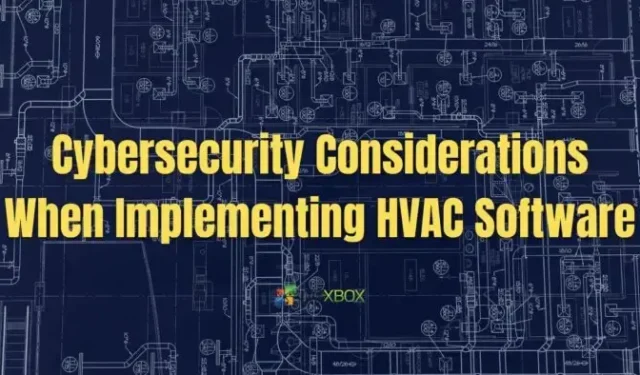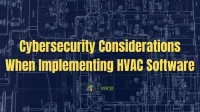As technology plays an increasingly important role in the HVAC industry, the use of software has become ubiquitous. While software solutions can provide numerous benefits, they also present potential cybersecurity risks that HVAC companies and customers should be aware of.
Protecting sensitive customer data, employee records, and financial information from unauthorized access and data leakage is critical to maintaining customer trust and avoiding costly legal and economic consequences.
Companies can reduce their cybersecurity risks and protect sensitive data by addressing these issues. The article will address the cybersecurity issues that HVAC companies need to consider when implementing software solutions.
1] Maintain security patches
One important cybersecurity consideration for HVAC software is to keep security patches up to date. Software vendors release patches to address these issues as vulnerabilities are identified. Failure to implement these patches may leave software and systems vulnerable to cyberattacks.
HVAC companies must update their HVAC software solutions with the latest security patches. They should also develop a process for monitoring and proactively applying patches to prevent potential security breaches. HVAC companies can improve the security of their software and protect their sensitive data from cyber threats by installing security patches.
2] Implement Mobile Device Management Tool
Another important cybersecurity factor for HVAC software is the implementation of a mobile device management (MDM) tool. MDM tools provide a centralized platform for managing and securing mobile devices used in the field, such as smartphones and tablets. These tools allow HVAC companies to set security policies, control access to sensitive data, and remotely wipe devices in the event of loss or theft.
MDM tools can also provide real-time monitoring and alerts for potential security breaches. By implementing an MDM tool, HVAC companies can increase the security of their mobile devices, reduce cybersecurity risks, and protect their sensitive data.
In addition, with MDM, companies can remotely lock or wipe lost or stolen devices to prevent unauthorized access to sensitive data. This is especially important for HVAC companies, as field technicians often carry mobile devices containing customer information, financial data, and other sensitive information. By implementing an MDM tool, HVAC companies can better protect their mobile devices and sensitive data, minimize the risk of data leakage, and maintain customer trust.
3] Educate users about the importance of website security.
A key cybersecurity consideration for HVAC software is to educate users about website security. HVAC companies must educate their employees, customers, and other stakeholders about the importance of website security and safe browsing practices. This includes training users to identify and avoid suspicious links, phishing, and other common cyber threats.
Companies should also implement strong password policies, two-factor authentication, and regular data backups to reduce the risk of cyberattacks. By educating users about website security, HVAC companies can create a culture of cybersecurity awareness, increase the security of their software, and protect their sensitive data from cyberthreats.
4] A good backup strategy is important
A backup strategy is essential when implementing HVAC software to ensure data protection and cyber security. It helps with the following;
- Reduces downtime
- Protects against data loss
- Enhances overall cyber security
- Enforces rules
Organizations should develop and implement a backup strategy tailored to their needs and requirements, and regularly test and update the system to ensure its effectiveness. In the event of a cybersecurity incident, having a good backup strategy in place can be critical to restoring systems and data to their previous state. It can also help prevent further damage by providing a clean data backup to help isolate and remove any malware or other cybersecurity threats.
5] Limit and Track Third Party Access
Restricting and monitoring third party access is critical to maintaining cyber security when implementing HVAC software. Third party vendors may need access to the system for service or support, but you must maintain strict control and monitoring to prevent unauthorized access or data leakage.
Restricting access through the principles of least privilege and multi-factor authentication, and monitoring access through auditing and logging can help identify and mitigate potential cybersecurity threats. Regularly checking third party access and ensuring that you only grant access to trusted and reputable vendors can further strengthen your cybersecurity measures.
Conclusion
Implementing HVAC software requires careful consideration of cybersecurity measures to protect against potential threats. A good backup strategy is essential to protect data and ensure system continuity, and restricting and monitoring third-party access can prevent unauthorized access and data leakage.
Organizations should implement a comprehensive cybersecurity framework that includes policies, procedures, and technologies to mitigate cybersecurity risks. Regular employee training and updates can also help maintain a high level of cybersecurity awareness and preparedness. By prioritizing cybersecurity, organizations can ensure the integrity, availability, and confidentiality of their HVAC systems and data.


